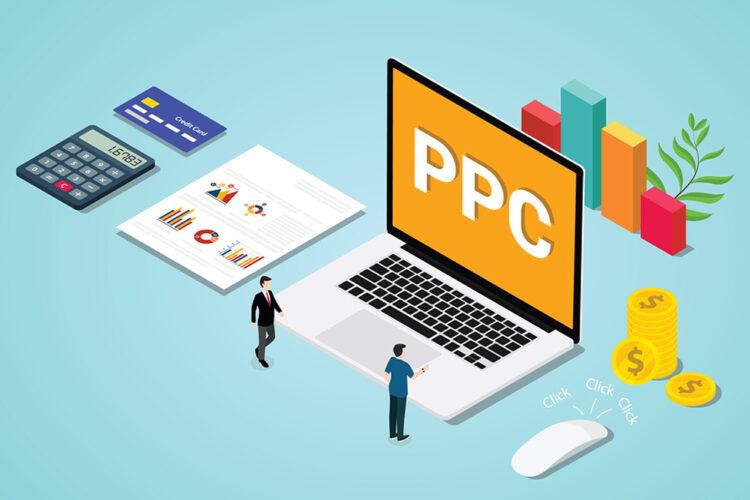
Pay-per-click or PPC is a model for digital advertising. When using them, you use metrics to identify a website’s performance. Simply put, it is the amount of money you will pay when your advertisement gets clicked on.
When a prospective visitor clicks on the advertisement, it directs the traffic to your company’s website. For example, one of the common PPC metrics is the ‘Top impression rate,’ which is calculated depending on how often your advertisement is displayed on the top pack of ads.
Accordingly, PPC performance metrics can give you an idea of the sales and conversion rates and help you create suitable leads. If you are ready to use PPC performance metrics for your business, here is a comprehensive guide to help you out.
What is Pay-Per-Click (PPC)?
Pay-Per-Click (PPC) is a model for digital advertising. Since a business with an online presence needs to use metrics to identify a website’s performance, PPC will give you an idea of the traffic to your company’s website.
Understanding Metrics Reporting and PPC Performance Metrics
Are you wondering how metrics reporting can improve your business? In reality, you actually need to observe the impact your creative team has on the target audience. Therefore, you also need to analyze whether or not the cost of your creative or marketing efforts is bringing in the expected revenues.
Metrics reporting is concerned with ensuring that the information required is available when you need it the most. It is a standard snapshot of the Key Performance Indicators (KPIs) or PPC performance metrics revealing whether or not you are on track to meet the respective goals.
One of the significant benefits of professional PPC management company is that we have an abundance of data in our fingerprints, and we can modify it almost instantly. Still, it can be tricky. Every metric and dimension will have its own goal behind it. Each campaign is expected to possess its own KPI to serve as the main focus.
Priority KPIs to Focus on for PPC Marketing
Most KPIs are primarily used for measuring the overall success of a business. PPC KPIs are standard metrics utilized by businesses and marketers to understand the overall performance of the respective PPC campaigns. Some crucial PPC marketing KPIs to track are:
- Revenue on Ad Spend (ROAS)
It is a metric capable of measuring the revenue generated by the PPC campaign against the total spend on advertisements. ROAS enables you to compare the efficiency of different PPC campaigns by presenting their revenue percentages against one another.
- Return or Profits on Paid Search Metrics
It refers to the return or profit on your overall PPC expenses. It is calculated by dividing the campaign profit by the total costs of the campaign. This one is a crucial measure as it reveals what type of return you can expect out of the investment, even when you might decrease or increase the respective PPC performance.
- Higher Funnel Engagement
For specific PPC campaigns, the goal might not be totally focused on sales but on better funnel engagement. In this case, measuring sales-centric data is crucial. Amidst this, there are several more engagement metrics that should be measured effectively, such as brand lift data and monitoring brand search.
- Campaign Health Metrics
It is crucial to track or monitor campaign health metrics as well. These metrics indicate whether or not the campaigns have more scope for improvement.
The Most Important PPC Metrics to Measure
When it comes to PPC performance metrics, the primary feature is the payment that you make for the clicks on the advertisements leading to your website traffic. You need to track these clicks to evaluate the quality of web traffic to your website. Based on the evaluation, you can improve your ad campaign and make changes to attract more traffic.
- Cost Per Click
The first thing that will strike you in a PPC model is the Cost-Per-Click (CPC). It can be a flat rate that the advertiser and the publisher can decide upon, so you will get a fixed price for each click. Alongside this, this will also give you an idea of the web traffic and the website’s performance. Primarily, flat-rate PPC is preferred by companies believing in long-term results.
Regarding the bid-rate PPC, it is used by companies looking for higher ranks in the Search Engine Result Pages (SERPs) and inclined towards geo-targeting for quick results. You can use this metric to identify the best way to improve the performance of your website while opting for real-time bidding and improving the conversion rate. Herein, getting in touch with a professional PPC company in the USA will help you evaluate the expenses incurred as a result of the advertisement campaign.
- PPC Metrics for Conversion Rates
PPC is undoubtedly the best way to regulate the web traffic diverted to your website. It indicates the conversion rates; thus, if you are wondering how to evaluate the PPC performance metrics, checking your website’s conversion rates is the best way to do it. Let’s understand it better with an example:
- If you are an entrepreneur or a business manager of an eCommerce platform, ensuring that organic web traffic gets directed to your website is essential. Here PPC plays a crucial role. When you have more visitors to your company’s website, you will know that more web traffic is diverted to your website.
- As more traffic is diverted to your website, your target audience will browse through the website and the subsequent web pages. This will help them understand the products and services your company offers. This is the first step to the funnel effect.
- And then, the conversion is completed when visitors purchase from the website. The prospective client is now a customer. PPC performance metrics will come into play here to evaluate how many conversions have occurred in each period.
You must evaluate the sales you get from the number of clicks. For instance, if you make 30 sales from 100 clicks, the conversion rate is 30%. This is a simple calculation, but the performance metrics can become more complex regarding the conversion rate. If the clicks lead to a loyal customer base who repeatedly buys from your website, you can be assured that your advertising campaign will succeed. This is a performance metric you need to factor in a PPC performance analysis.
PPC Performance Metric Regarding Brand Awareness
A PPC performance metric can help evaluate your brand’s popularity among your target audience. Regarding Internet marketing, you must understand how well a particular ad campaign will perform against your competitors. To ensure that it catches the eye of your target audience, you can do a trial run and evaluate the PPC performance metrics. This will also give you an idea of the brand association that your prospective clients have with your company, its products, and its services.
For example, when you develop an ad campaign, you must adhere to all the Search Engine Optimization (SEO) practices. This will ascertain that your clients have a better impression rate and associate with your brand easily.
The number of times prospective clients view your advertising will increase your campaign’s performance. If you are using the PPC metrics to evaluate the brand awareness of your company among your clients, you need to understand how well the advertisement campaign is performing. The easiest way would be to check the number of times your target audiences click on the advertisement. This will give you an idea of the performance of the advertisement campaign.
Understanding the Performance of Your Advertisement Based on the Landing Page
One of the best ways to understand the performance of an advertisement campaign and the PPC performance metrics would be to evaluate the landing page performance. The first thing that you need to understand here is that a landing page is designed to improve the position of your company’s website on SERPs. Here are some of the ways that you can identify the performance metrics:
- You will find that the SERPs are designed to ensure that the websites that receive more web traffic receive a higher ranking. When you use the PPC performance metrics, you will find that the higher the web traffic to your company’s website, the higher it ranks in the SERPs.
- When you review your analytics and find that your company’s website is not receiving the expected ranking in the SERPs, you can be assured that the PPC is not performing optimally. In such a scenario, you can seek assistance from a professional SEO service company in USA.
- With the help of SEO services, you can realign your advertisement campaign as per the required SEO practices, which can help improve the performance of your advertisement campaign. You will find that the PPC performance metrics are essential to understand the ranking of your website.
Thus, you can evaluate the performance of your advertisement campaign based on the ranking your company’s website receives on the SERPs. Subsequently, this will help you understand the performance of the PPC. Both are essential performance metrics as these will give you an idea of whether you need to change the existing advertising campaign. If your website has a reasonably high ranking on the SERPs, you need not change the advertisement campaign. Otherwise, you will need to use the PPC performance metrics and make suitable changes to the ad campaign.
Understanding Customer Base and Budget for Advertisements
As an entrepreneur or a business manager, you will have certain budget constraints when developing advertising campaigns. Moreover, you must ensure that these campaigns perform optimally to produce the best results. You can do this by creating a loyal customer base with the help of your PPC campaign. Your PPC metrics will give you an idea of the customer base you can achieve and whether you can convert to a reasonably loyal one. Your customers must continue returning and making purchases from your company’s website.
Thus, when you understand your customer base and your budget for advertisement, you need to evaluate the PPC metrics. You can make an estimate based on your expectations of the performance of the advertisement campaign. This will help you assess the customer’s lifetime value and check whether you need to acquire customers from other sources. This is another essential feature of the PPC performance metrics.
Vanity PPC Metrics to Avoid
Obsessing vanity PPC metrics can be an absolute waste of time and effort. Here are some of the PPC performance metrics that do not contribute to achieving your marketing goals:
- Social media followers
- Blog post views
- Likes
- Email open rate
- Traffic or impressions
PPC Audit Checklist
An in-depth PPC audit checklist offers a comprehensive overview of the PPC account towards assessing the overall performance, weaknesses, strengths, and what could be improved for better outcomes. Some crucial pointers to consider are:
- Provide basic information
- Select data sources
- Approval for account goals
- Determine PPC account goals
- Select the desired time frame
- Ensure tracking
Conclusion
When it comes to the PPC performance metrics, you must ensure that you have considered the advertisement campaign you have developed and the channels in which you have released the campaign. Your return on investment will also be an essential measure that will give you an idea of the PPC performance metrics. You will have to check the bounce rate to understand the quality of the advertisement campaigns. Thus, there are several ways to evaluate the PPC performance metrics. The best way to assess these would be with the help of a company that provides you with the analytics. This will help you develop a good PPC campaign to increase conversion rates.




